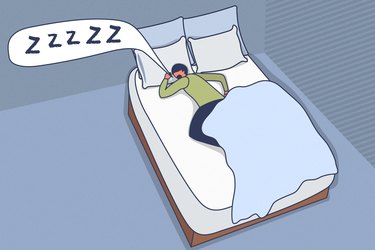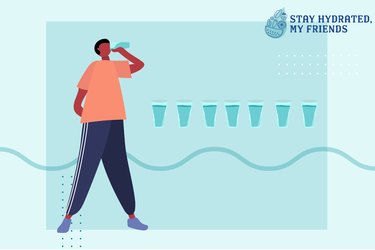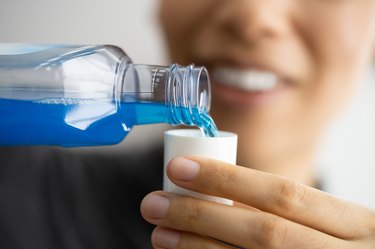

The Refresh is helping you freshen up on your oral-care knowledge and upgrade your dental-hygiene routine.
Is your mouth so parched it feels as though you've been guzzling sawdust, with a sandpaper-like tongue? Dry mouth (aka xerostomia, if you want to get technical) can be excruciating. But it's also surprisingly common. An estimated 22 percent of people worldwide have dry mouth, according to a December 2018 analysis in Brazilian Dental Journal.
These home remedies can offer relief at last.
Video of the Day
Video of the Day
1. Drink Lots of Water
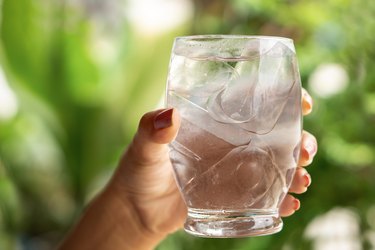
No surprise here: Upping your fluid intake is the fastest and easiest way to keep your mouth nice and moist.
"Have a minimum of eight glasses of water a day," says Diana Messadi, DDS, professor at UCLA School of Dentistry and an expert in xerostomia. "If you don't feel like drinking, even just squirting water in your mouth and swishing it around will help." Make it easy to drink more H20 by keeping a reusable water bottle on hand.
You may also want to toss in an ice cube. Cold water may offer greater relief from mouth dryness and stimulate more saliva than warm or room temp liquid, per a September 2014 study in Intensive Care Medicine.
For longer-lasting moisture, one strategy is to add one drop of aloe or glycerin for each ounce of water, according to Johns Hopkins Medicine. A watery glycerol solution (glycerol is similar to glycerin) quenches dry mouth for up to two hours, per a July 2019 study in the European Journal of Oral Sciences.
"You can also try sucking on small ice chips," Dr. Messadi says. Allowing them to melt slowly in your mouth can make you feel hydrated for longer.
Finally, since dry mouth can make swallowing food tricky, take sips of water between bites to help your meal go down easier.
4 Beverages to Break Up With
While it’s important to increase your water intake, steer clear of these sippers:
- Caffeinated drinks: We’re not cruel enough to say you can’t have that morning coffee! But stick to just one cup of java or tea a day, instead of five or six. “Caffeine is a diuretic, which dehydrate you,” Dr. Messadi says.
- Alcohol: This also falls into the diuretic category. An August 2017 study in the Japanese Dental Science Review concluded that heavy drinking increases thirst and oral dryness.
- Anything sugary, including sports drinks: You know soda’s not healthy, but you might think reaching for a Gatorade or coconut water will soothe your parched mouth better than plain old H20.
- Carbonated drinks: According to an April 2016 study in the Journal of the American Dental Association, bubbles (even sparkling water) increase acidity, which can erode tooth enamel and make it easier for cavities to set in. If you love your Spindrift, at least have it with a meal. Consuming fizzy drinks with food helps buffer acidity, per the Johns Hopkins Sjogren Center.
2. Adjust Your Medications
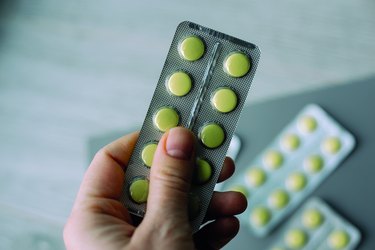
If you drink a lot of water already, but you still have cottonmouth, open up your medicine cabinet. Oral dryness is a common side effect of prescription and over-the-counter drugs.
"The number one cause of xerostomia is medication," Dr. Messadi says. The most common culprits: medications for depression and anxiety along with medications used to treat high blood pressure, she says. Antihistamines for allergies and decongestants for coughs and colds are common culprits, too, per the American Dental Association (ADA).
Talk to your health care provider about whether something you're taking could be causing dry mouth. They might be able to swap in a different med or adjust your dosage — for instance, certain types of antidepressants are less likely to dehydrate your mouth than others, according to the ADA.
Meanwhile, taking meds during the day instead of at night can be less drying, as can taking multiple smaller doses rather than one large dose. Just be sure to check with your physician before making any changes.
3. Stick on a Saliva-Stimulating Tablet
Dr. Messadi has seen good results with XyliMelts ($10.79, OraCoat.com), which are over-the-counter tablets about the size of an M&M. "You stick it to your gum and it stimulates the salivary glands," she says. "Put one on before bed to keep your mouth moist when you're sleeping, and you can also use it during the day."
Bonus: The active ingredient, xylitol, helps prevent tooth decay.
4. Spray on Mouth Moisturizer
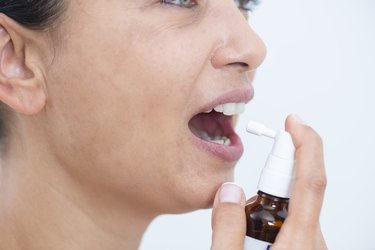
Over-the-counter oral sprays act like saliva substitutes, promising to keep your mouth hydrated. One to try: "Xerostom contains olive oil and parsley oil to lubricate your mouth," Dr. Messadi says. Give a spritz or two onto dry areas as needed.
Another option is MIGHTEAFLOW, which has xylitol and green tea. A small October 2020 study in the International Journal of Advanced Research found that gargling with green tea increased salivary rates more than gargling with distilled water.
Although Dr. Messadi can't vouch for green tea's effects on saliva, she points out that it is an antioxidant and anti-inflammatory. Many people with dry mouth have redness and inflammation on their tongues, so it's possible that it could help reduce swelling and irritation.
5. Turn on a Humidifier
Especially at night, it can soothe a Sahara-like mouth. "A humidifier will hydrate the atmosphere so that you are breathing in moist air," Dr. Messadi says.
6. Chew Sugar-Free Gum
Chewing triggers saliva production, so grab a stick of gum when your mouth feels like a giant cotton ball. People who chewed gum for 10 minutes at least six times a day had lower levels of dry mouth than a control group, according to a small January 2021 study in Hemodialysis International. A 2019 review in the Brazilian Nursing Journal also found that gum use increased saliva and decreased thirst.
But make sure you opt for the sugar-free kind. "People with dry mouth are more prone to cavities," Dr. Messadi says. "Saliva washes away the food and bacteria on your teeth, so if you lack adequate saliva, the bacteria can stagnate, leading to decay."
While you're at it, check the label to confirm it doesn't contain alcohol, which can exacerbate dryness. And for best results, pop a piece of mint gum; the Intensive Care Medicine study suggests that the flavor of mint also increases saliva output. MighTeaFlow Dry Mouth Gum ($3.99, Camellix.com) checks all these boxes.
7. Suck on a Zero-Sugar Lozenge or Hard Candy
This works similarly to chewing gum. To maximize saliva, choose citrus, cinnamon or mint flavor, per Johns Hopkins Sjogren Center. One brand to try: Salese lozenges ($7.50, NuvoraInc.com).
One thing to keep in mind: "Many sugar-free gums and lozenges contain the anticavity product xylitol," Dr. Messadi says. "Some people experience gas, bloating or diarrhea when they consume a lot of this." If you're having GI distress, back off the xylitol.
8. Swipe on Lip Balm
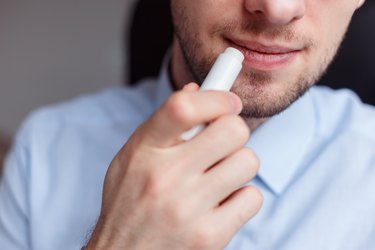
Chapped, peeling lips go hand in hand with a pasty mouth. It can help to frequently apply Vaseline, Aquaphor, lanolin, Burt's Bees Beeswax Lip Balm ($3.99, BurtsBees.com), or coconut oil, per Johns Hopkins Sjogren Center. Try to resist licking your lips, which will remove moisture.
9. Brush With a Dry-Mouth Toothpaste
Because xerostomia puts you in the cavity danger zone, it pays to be a boss about dental hygiene. You know the drill: Floss on the reg and brush for a full two minutes a minimum of twice a day. But some toothpastes are better for dry mouth than others.
Dr. Messadi notes that many of her patients have had success with coconut oil-based toothpaste. "It lubricates your mouth and helps reduce inflammation," she says. Consider using toothpaste designed for dry mouth, such as Biotene Gentle Mint Fluoride Toothpaste ($6.59, Walmart.com) or CloSYS Sensitive Toothpaste ($3.99, Closys.com), per the Johns Hopkins Sjogren Center.
On the other hand, skip whitening, tarter control and strongly flavored mint toothpastes, all of which are abrasive. Two ingredients to avoid: alcohol (it's drying) and sodium laurel sulfate (SLS), which can be harsh on your tooth enamel.
10. Gargle With a Lubricating Mouthwash
Moisturizing mouthwashes can help stave off cottonmouth, according to the Mayo Clinic. (Just make sure to avoid common mouthwash mistakes.) Two moisturizing mouthwashes to try, per the Mayo Clinic, are Biotene Dry Mouth Oral Rinse ($6.24, Amazon.com) or ACT Dry Mouth Mouthwash ($7.80, Walmart.com), both of which contain xylitol for extra cavity protection.
"Make sure your mouthwash does not contain alcohol, which is drying," Dr. Messadi says. Look for products labeled "alcohol-free."
11. Tweak Your Diet
Although there aren't any foods that will improve xerostomia, per se, it's smart to limit sticky sweets since you're cavity prone. And because a dry mouth is more easily irritated, you may want to lay off anything that's spicy, salty, acidic, crunchy or hard to chew.
12. Try Acupuncture
Alternative medicine might boost your mouth moisture. In a December 2020 review in Integrative Cancer Therapies, acupuncture produced a significant improvement in dry mouth compared to a control group.
13. Quit Smoking
A February 2021 study in Epidemiology and Health determined that smoking decreases salivary flow rates. For help kicking the habit, download Livestrong's MyQuit Coach app.
14. Breathe Through Your Nose
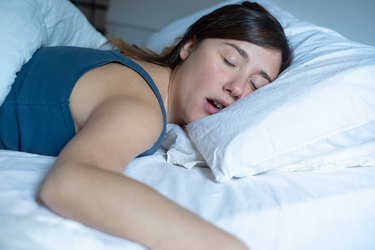
You're at greater risk of xerostomia if you breathe through your mouth. "Mouth breathing can indicate sleep apnea or a nasal or sinus problem, such as a deviated septum," Dr. Messadi says. "See an ENT to figure out why you are breathing through your mouth."
Not sure if you breathe through your mouth at night? "If you often wake up in the morning with a dry mouth but don't experience xerostomia during the day, this could mean you're a mouth-breather," Dr. Messadi says.
What Causes Mouth Dryness?
Several factors could be to blame. "If you have dry mouth, the most important thing is to understand the cause," Dr. Messadi says. As we mentioned earlier, medication is the number one reason, and mouth-breathing can also dry you out.
It's also possible that you have a health issue. "Conditions like diabetes and certain autoimmune diseases such as Sjogren Syndrome attack the salivary glands," Dr. Messadi says. According to the ADA, Alzheimer's and Parkinson's commonly present with dry mouth, too. Talk to your physician to rule out something serious.
In addition: "Cancer treatment, like radiation or chemotherapy, can induce dry mouth," Dr. Messadi says. "In this case, medication can be given prior to radiation to protect the salivary glands."
Finally, you might experience a dry, pasty mouth if you talk a lot during the day, Dr. Messadi points out. The more frequently your mouth is open, the more likely it is to get dry — that could be why a long run leaves you with dry mouth.
The good news: Dry mouth might be temporary. Once you a) determine the root cause and b) address that factor (if possible), it should clear up. The fastest ways to end dry mouth is adjusting your medications if necessary, using over-the-counter saliva stimulators or substitutes and upping your fluids.
"There are two FDA-approved medications to treat dry mouth," Dr. Messadi says. "But they have side effects, so I only use them in severe cases."
What if Your Dry Mouth Is Due to COVID-19?
A few things could be at play. “COVID-19 causes nasal congestion, which may lead you to breathe more from your mouth,” Dr. Messadi says. “And if you take a decongestant, this can also result in dry mouth.”
Plus, you know how COVID-19 can impact your nerves, causing you to lose your sense of smell and taste? It turns out these same nerves are integral to saliva production. “Saliva is secreted by a specific nerve enervation to the salivary gland,” Dr. Messadi says. “COVID-19 can create irritation in these nerves, and the salivary glands won’t activate.”
To soothe dry mouth while you have COVID-19, drink plenty of water, try a saliva substitute (such a spray or XyliMelt tablet) and make the humidifier your BFF.
- Brazilian Dental Journal: "How Common is Dry Mouth? Systematic Review and Meta-Regression Analysis of Prevalence Estimates"
- Intensive Care Medicine : "A Randomized Clinical Trial of an Intervention to Relieve Thirst and Dry Mouth in Intensive Care Unit Patients"
- ADA: "Xerostomia"
- International Journal of Advanced Research: "THE IMPROVEMENT OF SALIVA FLOW RATE BY GARGLING GREEN TEA STEPPING IN MENOPAUSE WOMEN WITH XEROSTOMIA"
- Hemodialysis International: " The effect of chewing gum on dry mouth, interdialytic weight gain, and intradialytic symptoms: A prospective, randomized controlled trial "
- Brazilian Nursing Journal: "Effect of chewing gum on thirst: an integrative review"
- Johns Hopkins Sjogren Center: "Management of Dry Mouth"
- Integrative Cancer Therapies: "Acupuncture for Radiation-Induced Xerostomia in Cancer Patients: A Systematic Review and Meta-Analysis"
- Japanese Dental Science Review: "Thirst sensation and oral dryness following alcohol intake"
- Journal of the American Dental Association: "The pH of beverages in the United States"
- Epidemiology and Health: "The effect of demographic characteristics on the relationship between smoking and dry mouth in Iran: a cross-sectional, case-control study"
- Mayo Clinic: "Dry mouth treatment: Tips for controlling dry mouth"
- Johns Hopkins Medicine: "Dry Mouth Remedies: 14 to Try"
Is this an emergency? If you are experiencing serious medical symptoms, please see the National Library of Medicine’s list of signs you need emergency medical attention or call 911.







